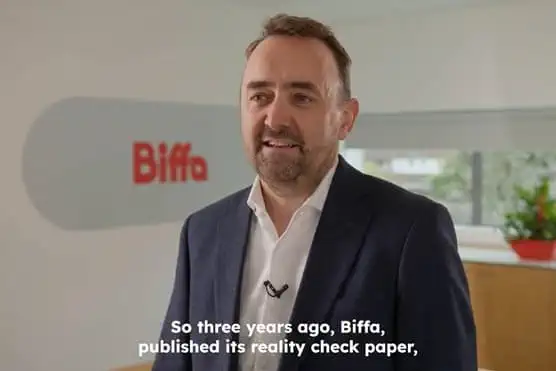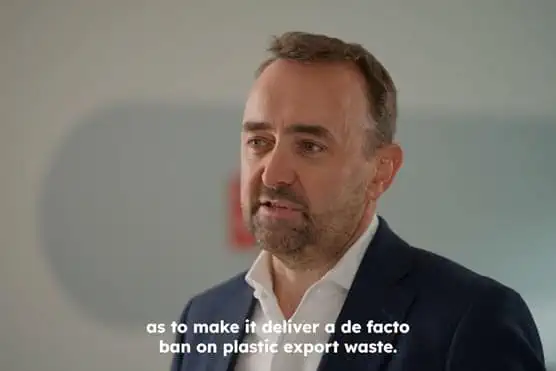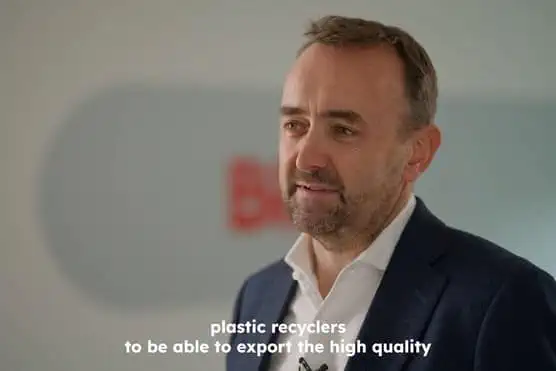Reality Check 2025

A once in a generation opportunity
The last 24 months have shown us just how powerful regulation can be. Even though improvements are needed to the way in which it happens, the size of the prize is clear. Simpler Recycling for businesses with ten or more full time equivalent (FTE) employees went live March 31st this year; only six months into the rollout the effect on material recovery has been significant.
Across Biffa’s customer base, the number of businesses we collect food waste from has grown by almost 50 percent compared to the same period the last two years previous. That equates to tens of thousands of tonnes of material, roughly the weight of two and a half Eiffel Towers; much of it diverted into Anaerobic Digestion and composting. If processed into biogas, that would be enough to power up to 2,880 homes for a year*.
Every tonne of food waste diverted from residual waste needs more containers to capture it; more trucks are needed to move it; more facilities are required to process it; and more people are employed to keep the system running. Waste is proving itself not only as an essential environmental service but also as a driver of economic growth. The UK is at the threshold of a once in a generation opportunity to turn waste into one of the key growth areas of the next decade.
Reality Check 2025 report
The reality of operational rollout
Simpler Recycling, following Workplace Recycling reforms in Wales, is the first of the Resources and Waste Strategy measures to deliver a real national operational shift in material flows. It shows the potential scale of what can be achieved and serves as a milestone for what comes next, but the impact has not come easily.
Delivering this phase of Simpler Recycling has stretched the sector and we need to learn this lesson for the future. Orders for new containers and collection services landed all at once. Truck ordering lead times were stretched to more than a year. There is still a challenge around compliance and enforcement, with too many businesses still using general waste only for all their waste collections. These challenges stemmed from delays and changes to the original Consistent Collections policy, inconsistent information on exemptions, and the absence of a clear timeline that would have allowed the sector and supply chain to prepare.
The sector has had to scale existing solutions to respond to Simpler Recycling, managing material streams such as mixed recycling and food, where collection and processing already existed. The next set of policies is different. The Deposit Return Scheme, plastic film collections as part of Simpler Recycling, and the Emissions Trading Scheme potentially require new technology or infrastructure to deliver – all within the timeline of 2-3 years.
These policies are interdependent, which means that delay or misalignment in one creates unintended consequences across the entire system. The risk is that the UK has not been consistently rolling out investment grade policy, while the progress in the last 24 months is encouraging, there is a track record of delay and dilution.
Michael Topham talks Reality Check
Three things that can be done now to move toward a circular economy
Regulatory progress since 2022
Looking back, the UK has made only partial progress in the last three years. Packaging Extended Producer Responsibility (pEPR) has been only partially rolled out, with fee payments delayed. The Deposit Return Scheme has faced multiple delays, now expected in 2027. Consistent Collections was watered down to Simpler Recycling with comingled options. While work on carbon capture for Energy from Waste facilities is moving forward, new plants can still be permitted without Carbon Capture.
The Plastic Packaging Tax (PPT) was launched in 2022 to increase recycled content in plastic packaging but it has had unintended consequences. It has served as a cap on recycled content rather than a driver, and the sector is struggling more now than it was before it was introduced.
Due to the policy delays and unintended consequences, recycling rates are still stagnant, plastics facilities have closed, and investment has slowed as markets wait for clarity. While businesses like Biffa continue to grow in this environment, the wider system risks falling behind at the very moment the UK should be competing for a stake in the global green industrial revolution.
The opportunity remains enormous if we get it right. We could see similar shifts in material recovery as we have in the initial phase of Simpler Recycling. Four areas stand out as clear opportunities:
- Plastics: we must keep material onshore, make the Plastic Packaging Tax progressive, and clamp down on unverifiable imports.
- Food: we must stop surplus from becoming waste by creating a level playing field for redistribution through both charitable and commercial channels.
- Construction: we need mandatory segregation on sites, stronger demand for recycled content in new projects, and digital waste tracking to make material flows visible.
- Decarbonise residual waste: remove organics from landfill, reduce fossil-based materials from residual waste, and implement Emissions Trading Scheme for EfWs.
Biffa has launched a thought leadership report Reality Check 2025 providing the detail on what the UK needs to do to seize this opportunity.
Three principles for progress
Policy does not happen in a vacuum – it needs to be engaged with and supported:
- Citizenship must sit at the heart of the transition. People are not passive consumers but active participants, and policies depend to varying degrees on behaviour change.
- We cannot let perfect be the enemy of good. Progress will not be seamless, but momentum is more important than flawless execution, let’s get regulations live and progressively iterate.
- Innovation must be given space to grow. From AI-enabled sorting to carbon capture and sustainable aviation fuels, much of technology exists but they need stable markets and strategic partnerships to reach scale.
Simpler Recycling has proved that the waste sector is ready to respond, the demand is visible and the economic and environmental benefits are clear. What is needed now is investment grade policy that provides long term certainty and unlocks capital. With the right framework, waste can become one of the UK’s most dynamic growth industries, creating jobs, cutting carbon and securing resources for the future.
Download Biffa's report: Reality Check 2025 | Enabling a UK circular economy
*Energy from Biffa food waste volume was estimated by applying assumed biogas yield per tonne of feedstock to calculate total biogas volume, converting this to energy content, applying standard CHP electrical efficiency, and expressing the resulting electricity as the annual equivalent consumption of UK homes. Sources available on request.


